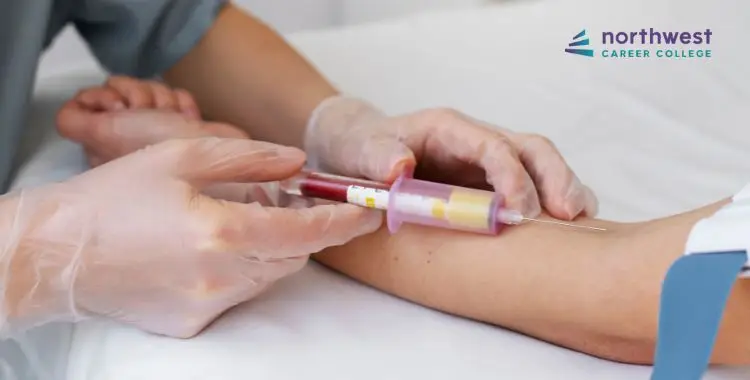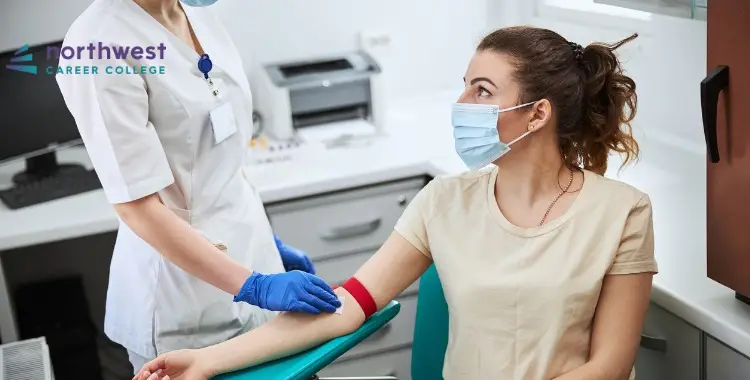What Do You Learn During NCC’s Phlebotomy Training?
- Phlebotomy Technician
- March 12, 2024
- 3.9k views
- 5 min read

Are you considering a career in phlebotomy? It’s an exciting and rewarding line of work vital to many healthcare settings.
Researching a phlebotomy program, such as the one offered by NCC, can help you learn what it takes to become a certified professional.
This blog post will explore what knowledge and skills are taught in their phlebotomy training program and why it might be the perfect choice for those looking to jumpstart their new career!
Table of Contents
- Overview of Phlebotomy and the Types of Procedures It Involves
- Differences between Venipuncture and Skin Puncture Techniques
- Best Practices for Identifying and Collecting Blood Samples
- Proper Use of Safety Protocols in the Lab
- How to Prepare, Transport, and Handle Specimens Safely and Efficiently
- Common Lab Tests Performed and How to Interpret Results
- Start your new career today
Overview of Phlebotomy and the Types of Procedures It Involves
Phlebotomy is collecting blood from a patient for various purposes, including lab tests, blood donations, or transfusions.
This crucial medical procedure involves skilled professionals and requires extensive anatomy, safety procedures, and patient care knowledge.
There are several types of phlebotomy procedures, including venipuncture, capillary puncture, and arterial puncture, each serving a unique purpose in gathering blood samples.
- Venipuncture is the most common phlebotomy method, where a needle is inserted into a vein to collect a blood sample.
- Capillary puncture involves puncturing the skin to collect a small amount of blood, typically used for glucose monitoring.
- Arterial puncture, on the other hand, involves puncturing an artery to collect samples for blood gas analysis.
These procedures must be carried out with precision and care, and trained professionals in phlebotomy are essential in providing accurate medical diagnoses and treatments.
Differences between Venipuncture and Skin Puncture Techniques
Our phlebotomy students are trained in venipuncture and skin puncture techniques.
Venipuncture and skin puncture are techniques used to obtain blood samples for diagnostic purposes. Venipuncture involves drawing blood from a vein, while skin puncture entails pricking the skin to get a tiny amount of blood.
Although both techniques serve the same purpose, they differ in accuracy and the type of tests they are best suited for.
Venipuncture provides a larger sample size, making it ideal for tests that require more volume, like a complete blood count. On the other hand, skin puncture is less invasive and can offer quicker results, making it ideal for blood glucose tests in patients with diabetes.
Both techniques have their strengths and weaknesses, and it is crucial to understand the differences between them to determine the appropriate method for a particular diagnostic test.
Best Practices for Identifying and Collecting Blood Samples
To help our students get the most from their phlebotomy training, we offer clear best-practice guidelines on identifying and collecting blood samples properly.
Accurately identifying and collecting blood samples is crucial in healthcare settings. It is essential to follow best practices to ensure the safety and well-being of patients.
When identifying patients, it is essential to verify their identity using at least two unique identifiers, such as their full name and date of birth. Following proper techniques to prevent contamination and ensure accurate results is essential when collecting blood.
One should always use a new, sterile needle and syringe for each patient and adequately label the collected sample with the patient’s information. Additionally, it is essential to properly dispose of used needles to prevent injury or infection.
Proper Use of Safety Protocols in the Lab
When it comes to working in a lab, safety should always be the top priority, which is why lab safety is a core part of our phlebotomy program. Proper use of safety protocols is crucial to ensuring that experiments are conducted without harm to yourself or others.
Some basic safety guidelines include wearing appropriate clothing and personal protective equipment, labeling all chemicals and equipment, and properly disposing of hazardous materials.
Maintaining a clean and organized workspace is also important to minimize the risk of accidents. By following these safety protocols, you can confidently conduct experiments and contribute to scientific advancements without putting yourself or others in danger.
How to Prepare, Transport, and Handle Specimens Safely and Efficiently
Once the blood has been drawn or specimens have been collected for laboratory testing, it is essential to transport them safely and efficiently. Our Phlebotomy Program offers valuable guidance on proper specimen collection, labeling, transport, and storage protocols.
Medical specimens are delicate and require specific preparation, transportation, and handling to prevent contamination and ensure accurate results. Following strict protocols when packaging and labeling specimens are crucial to avoid any mishandling during transit.
Proper handling of specimens includes wearing personal protective equipment, observing sanitation protocols, and utilizing secure storage containers. This will mitigate the risk of exposure to hazardous materials and safeguard specimen integrity.
Common Lab Tests Performed and How to Interpret Results
A holistic understanding of laboratory tests and their corresponding results is essential for optimal patient care. Our Phlebotomy Program covers standard lab tests and how to interpret their results.
Some of the most common lab tests are complete blood count, blood glucose level, cholesterol level, and kidney and liver function tests. However, just getting the test done is not enough. Knowing how to interpret the test results to understand a patient’s health is equally important.
As part of NCC’s Phlebotomy Program, students learn how to interpret lab test results and what may cause them to be abnormal. This is a crucial part of the program as it helps students understand the significance of any abnormalities they encounter.
Phlebotomy can be an exhilarating and rewarding career choice. With its multiple facets requiring skilled expertise, phlebotomy offers a variety of opportunities for laboratory professionals looking to make an impact in healthcare.
Are you ready to take your place in this dynamic field? Then contact Northwest Career College today about our Phlebotomy Program!
Start your new career today
At Northwest Career College, we pride ourselves on providing one of the premier Phlebotomy Schools in Las Vegas.
Our established and seasoned instructors will take you through every aspect of Phlebotomy, and Northwest offers day, afternoon, and night classes to accommodate your busy Las Vegas work and family schedule.
Call us today at (702) 403-1592 to speak to one of our admissions specialists about your new Phlebotomy career.





